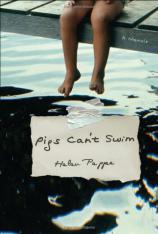Pigs Can't Swim: A Memoir
Review
Pigs Can't Swim: A Memoir
Perhaps comparisons to books by Dorothy Allison and Jeanette Walls are inevitable because Helen Peppe’s memoir, PIGS CAN’T SWIM, also deals with poverty, parenting failures, insecurity and childhood dangers. But it is worth it to understand the book as having its own story to tell. The youngest of nine kids growing up in small-town Maine, Peppe recalls a childhood of hard work, squabbling siblings, distracted parents, long school bus rides, and her love of books and animals in a series of roughly chronological chapters that combine the humor and anxiety that seemed to have characterized her early life.
Peppe never names her older siblings, instead describing them as the “blustery-and-favored one,” the “sister-who-holds-grudges-longer-than-God,” the “tough-yet-admirable” sister and the “hair-twirling-pretty sister.” This is at once charming and disconcerting --- quirky, like many of Peppe’s storytelling traits, but also a bit defensive as the reader is never really allowed into the home and family Peppe describes.
"Perhaps comparisons to books by Dorothy Allison and Jeanette Walls are inevitable because Helen Peppe’s memoir, PIGS CAN’T SWIM, also deals with poverty, parenting failures, insecurity and childhood dangers. But it is worth it to understand the book as having its own story to tell."
Early in the memoir, Peppe focuses on the craziness of the household with its farm animals in the barn and pets in the yard, shared bedrooms, kids coming and going, and overworked and old-fashioned parents. The age difference between Peppe and her oldest brothers and sisters meant that she grew up surrounded by teenagers. And these teens often employed her as a lookout when they smoked in the woods or snuck boys into their rooms. There was a lovable but wild horse named Donny that belonged to one brother and dogs that messed up the house. There were chickens and sheep that inevitably became food, and an angry and ignorant relative who always seemed to be around.
But all is not sunny for Peppe living in the isolated house at the end of the dead-end road. Despite all the activity in her house, she is lonely, turning to books for company, especially those by Stephen King (whose stories are often set in Maine). She is under constant threat from her siblings both physically and emotionally, and her parents have little time for her or are less than clear in their answers to her basic questions. For example, she accidentally learns what her father does for a living.
There are two major relationships that come to characterize PIGS CAN’T SWIM by the end: the one Peppe has with the man who sexually molested her and the one she has with her high school boyfriend. The older man who abused her was a friend of one of her brothers who used babysitting as a cover for his manipulations. She was 12, and he was 26; when she told her parents, they accused her of ruining his marriage and life. But counterpoint to that trauma was the relationship with her high school boyfriend, Eric, later her husband. The romance is all-consuming and nicely described, though it too faces tragedy early on. There is much heartbreak in this book and not a lot of in-depth examination or insight. Instead, Peppe gives us glimpses into a family that was difficult, undereducated, poor, rambunctious, and loving in its own way.
Sometimes the writing can be disjointed and repetitive, but is also brave and appealingly honest. In PIGS CAN’T SWIM, Peppe captures, but never really explains or confronts, her strange upbringing. She does, however, tell the story of her own self --- a determined and thoughtful child who grows to find amazing love and companionship, and develops an eye for beauty and a capacity for forgiveness.
Reviewed by Sarah Rachel Egelman on February 14, 2014
Pigs Can't Swim: A Memoir
- Publication Date: February 4, 2014
- Genres: Nonfiction
- Hardcover: 272 pages
- Publisher: Da Capo Press
- ISBN-10: 0306822725
- ISBN-13: 9780306822728




